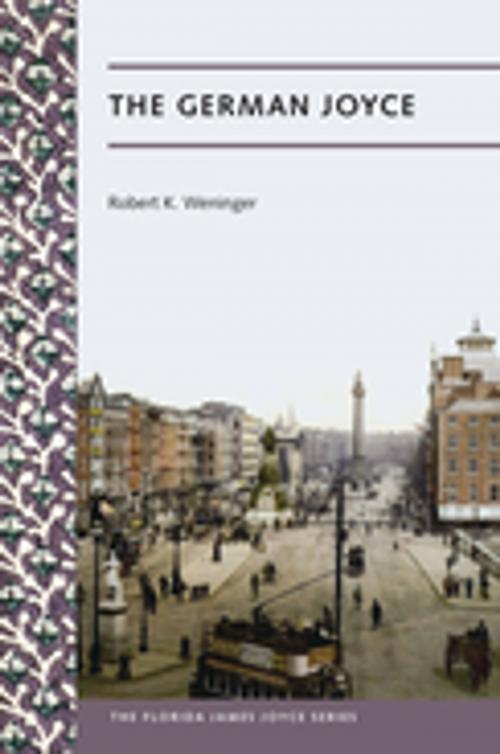The German Joyce
Fiction & Literature, Literary Theory & Criticism, British, Biography & Memoir, Literary| Author: | Robert K. Weninger | ISBN: | 9780813059822 |
| Publisher: | University Press of Florida | Publication: | November 29, 2016 |
| Imprint: | University Press of Florida | Language: | English |
| Author: | Robert K. Weninger |
| ISBN: | 9780813059822 |
| Publisher: | University Press of Florida |
| Publication: | November 29, 2016 |
| Imprint: | University Press of Florida |
| Language: | English |
"The first comprehensive account of the enormous impact of Joyce on German modernist and postmodern writers. An indispensable book on Joyce's 'German' face."—Gerald Gillespie, Stanford University In August 1919, a production of James Joyce's Exiles was mounted at the Munich Schauspielhaus and quickly fell due to harsh criticism. The reception marked the beginning of a dynamic association between Joyce, German-language writers, and literary critics. It is this relationship that Robert Weninger analyzes in The German Joyce. Opening a new dimension of Joycean scholarship, this book provides the premier study of Joyce's impact on German-language literature and literary criticism in the twentieth century. The opening section follows Joyce's linear intrusion from the 1910s to the 1990s by focusing on such prime moments as the first German translation of Ulysses, Joyce's influence on the Marxist Expressionism debate, and the Nazi blacklisting of Joyce's work. Utilizing this historical reception as a narrative backdrop, Weninger then presents Joyce's horizontal diffusion into German culture. Weninger succeeds in illustrating both German readers' great attraction to Joyce's work as well as Joyce's affinity with some of the great German masters, including Goethe and Rilke. He argues that just as Shakespeare was a model of linguistic exuberance for Germans in the eighteenth century, Joyce became the epitome of poetic inspiration in the twentieth. This volume, through Weninger's critiques and repositions, simultaneously revisits the fraught relationship between influence and intertextuality in literary studies and reassesses their value as tools for contemporary comparative criticism today. Robert K. Weninger, emeritus professor of German and comparative literature at King’s College London, is author or editor of over ten books, including Arno Schmidts Joyce-Rezeption 1957-1970: Ein Beitrag zur Poetik Arno Schmidts, and is a past editor of the Journal of Comparative Critical Studies.
"The first comprehensive account of the enormous impact of Joyce on German modernist and postmodern writers. An indispensable book on Joyce's 'German' face."—Gerald Gillespie, Stanford University In August 1919, a production of James Joyce's Exiles was mounted at the Munich Schauspielhaus and quickly fell due to harsh criticism. The reception marked the beginning of a dynamic association between Joyce, German-language writers, and literary critics. It is this relationship that Robert Weninger analyzes in The German Joyce. Opening a new dimension of Joycean scholarship, this book provides the premier study of Joyce's impact on German-language literature and literary criticism in the twentieth century. The opening section follows Joyce's linear intrusion from the 1910s to the 1990s by focusing on such prime moments as the first German translation of Ulysses, Joyce's influence on the Marxist Expressionism debate, and the Nazi blacklisting of Joyce's work. Utilizing this historical reception as a narrative backdrop, Weninger then presents Joyce's horizontal diffusion into German culture. Weninger succeeds in illustrating both German readers' great attraction to Joyce's work as well as Joyce's affinity with some of the great German masters, including Goethe and Rilke. He argues that just as Shakespeare was a model of linguistic exuberance for Germans in the eighteenth century, Joyce became the epitome of poetic inspiration in the twentieth. This volume, through Weninger's critiques and repositions, simultaneously revisits the fraught relationship between influence and intertextuality in literary studies and reassesses their value as tools for contemporary comparative criticism today. Robert K. Weninger, emeritus professor of German and comparative literature at King’s College London, is author or editor of over ten books, including Arno Schmidts Joyce-Rezeption 1957-1970: Ein Beitrag zur Poetik Arno Schmidts, and is a past editor of the Journal of Comparative Critical Studies.















